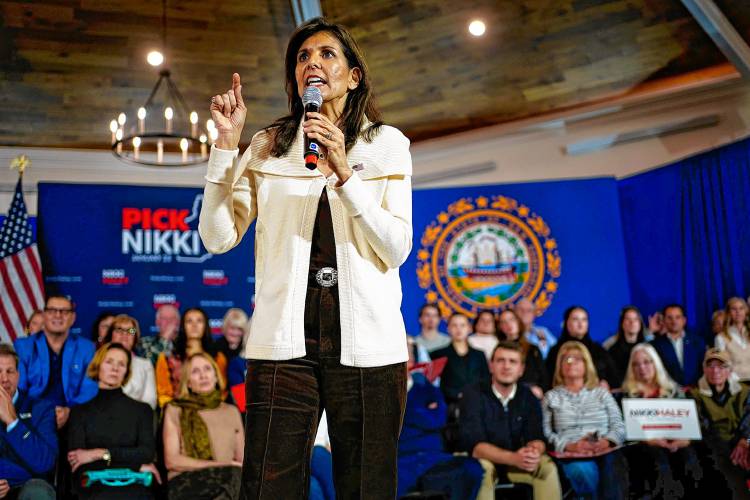Editorial: The GOP still fights the Civil War

Republican presidential candidate former UN Ambassador Nikki Haley speaks at a town hall campaign event, Tuesday, Jan. 2, 2024, in Rye, N.H. (AP Photo/Robert F. Bukaty) Robert F. Bukaty—AP
|
Published: 01-06-2024 1:32 PM
Modified: 01-09-2024 8:46 AM |
On one hand, it is inexplicable that Nikki Haley would fail to cite slavery as the cause of the Civil War in response to a direct question at a town hall event in Berlin, N.H., last month. On the other hand, it is entirely too explicable in the context of current national Republican politics.
First and foremost, Haley was campaigning in the heart of New England, a stronghold of abolitionist sentiment in the years leading up to the war. New Hampshire and its near neighbors in Maine, Massachusetts and Vermont made grievous sacrifices during that bloody war to preserve the union and bring down the slave power of the South, centered in Haley’s home state of South Carolina. Her omission of slavery in response to the question, “What was the cause of the United States Civil War” dishonors the memory of those who gave “the last full measure of devotion” to that cause.
Beyond geographical and historical insensitivity, the politics of the answer is puzzling. Haley is relying on moderate Republicans and independents to overtake Donald Trump in the Granite State’s presidential primary later this month. She had been making some headway recently, if the polls are to be believed.
But it is hard to think of a quicker coalition-killer than what Haley didn’t say in response to the question by an audience member in Berlin. No doubt that’s why she walked back her answer the next day, assuring an interviewer that, “Of course the Civil War was about slavery.”
In some ways, what Haley did say in response to the town hall question was just as telling as what she didn’t. “I mean, I think it always comes down to the role of government and what the rights of the people are,” she said in part. “... I will always stand by the fact that I think government was intended to secure the rights and freedoms of the people. It was never meant to be all things to all people.”
This might suggest that Haley believes the Civil War resulted from overreach and coercion by the federal government that impinged on the rights and freedoms of Southern slave-holders. But we doubt that she does so believe. More probably, Haley’s answer reflects deference to 150 years of effort by apologists for the antebellum South to veil the true cause of the Civil War behind a smoke-screen of states’ rights and romantic nonsense about a supposedly genteel way of life.
Today’s Trump-enthralled Republican Party is at the epicenter of that effort and the accompanying one of trying to deny the crippling legacy of slavery in the national life. Trump, indicted as the author of his own insurrection, railed against the movement to take down or replace statues of Confederate heroes in 2020, saying it was an attempt “to vandalize our history.” Florida Gov. Ron DeSantis, another presidential rival of Haley’s, was quick to criticize her non-slavery answer, but has defended curriculum standards in his home state which teach that some enslaved people acquired beneficial economic skills while held in bondage.
In short, Haley appears to be unwilling to offend the Trump base. This is not the first time she has fallen into a trap of her own devising. For example, while talking to two leaders of Confederate heritage groups in 2010, she described the Civil War as a struggle between “tradition” and “change.”
Article continues after...
Yesterday's Most Read Articles
 They remember Vietnam protests. Now, they're facing charges after protesting the Gaza war at Dartmouth.
They remember Vietnam protests. Now, they're facing charges after protesting the Gaza war at Dartmouth.
 Homeless Upper Valley couple faces ‘a very tough situation’
Homeless Upper Valley couple faces ‘a very tough situation’
 NH search crew finds remains of long-missing hiker in remote wilderness area
NH search crew finds remains of long-missing hiker in remote wilderness area
 Bears girls finish first in CVC Championships
Bears girls finish first in CVC Championships
To this we would contrast an excerpt from the Second Inaugural Address of a certain moderate Republican president, delivered on March 4, 1865. “One eighth of the whole population were colored slaves, not distributed generally over the Union, but localized in the southern part of it. These slaves constituted a peculiar and powerful interest. All knew that this interest was, somehow, the cause of the war. To strengthen, perpetuate, and extend this interest was the object for which the insurgents would rend the union, even by war; while the government claimed no right to do more than to restrict the territorial enlargement of it.”
Nikki Haley is surely no Abraham Lincoln. But to her credit, she’s also no Donald Trump. So maybe the next time she gets a tricky question about the Civil War, she could refer to the former rather than defer to the latter.

 Editorial: Response to campus protests only adds fuel to the fire
Editorial: Response to campus protests only adds fuel to the fire Editorial: Chris Sununu’s moral vacuum
Editorial: Chris Sununu’s moral vacuum Editorial: Gambling tarnishes America’s sporting life
Editorial: Gambling tarnishes America’s sporting life By the Way: A white nationalist’s many mistruths
By the Way: A white nationalist’s many mistruths
